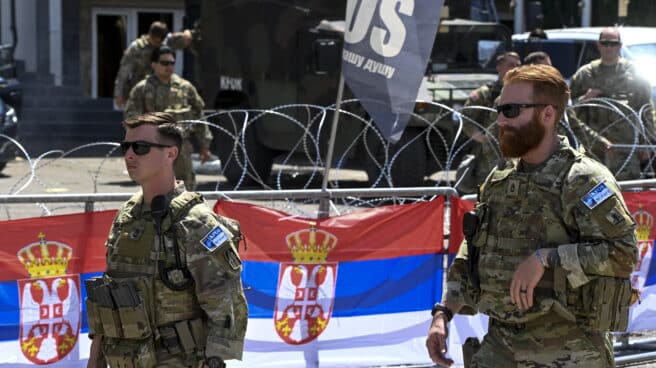

US KFOR soldiers in front of the Leposavic Town Hall in northern Kosovo.
The boycott of municipal elections in Kosovo by the Serb minority escalated tensions in the Balkans, leading to the intervention of KFOR, the NATO-flagged International Peacekeeping Force in Kosovo. Under Kosovo’s electoral law, there is no minimum turnout to invalidate an election, resulting in ethnic Albanian mayors elected in a Serb-majority region.
This fact has inflamed the north of the country, mainly due to the role of Serbia and its nationalist discourse about not having bilateral negotiations with Kosovo because of its independence, declared in 2008. After the large-scale Russian invasion of Ukraine, the role of Serbia, and especially Alexander Vucicits president was supposed to maintain a balance of positions between Russia and the European Union.
On the one hand, most of the population supports Russia, but the government wants to promote European integration. This crossroads means that, in order not to confront the situation, the Serbian government has decided to return to the nationalist path in order to satisfy an increasingly disaffected population.
The fact that the Serbian government put troops on alert because Kosovo sent security forces to enforce the law and Albanian mayors were allowed to take office shows how reluctant the Serbian side is to resolve the conflict. When European diplomacy achieves some normalization of relations between the two administrations, the Serbian side again aggravates the conflict.
It is no coincidence that the war in Ukraine and the role that Russia will play in the European future will be discussed at the gates of the European summit. The Kosovo question continues to divide the countries of the European Union, especially when some recognize it and others do not, such as Spain, Slovakia, Romania, Greece or Cyprus.
albino kurti, the prime minister of Kosovo, wants to present himself to the Kosovo society as a strong leader capable of guaranteeing, like any leader of any state, its integrity and respect for the rights of minorities. The consequence of this fact is that in areas where the Serbian national minority is 90%, the Kosovo state should prevail, whether they recognize it or not.
Pressure from Europe, especially from Germany and France, has paid off as the government, despite believing that the current election results are legitimate and correct, has opened up for re-elections in four northern municipalities. We will have to see to what extent surrender will be considered, but it is also true that giving in to the Franco-German request allows Kosovo to normalize diplomatic relations and expose Vučić, if he escalates again, as the sole culprit in the unrest. .
The EU asks Kosovo to repeat municipal elections, but at the same time reminds Serbia that Kosovo has important supporters and that KFOR is deployed there.
The last factor matters. The European Union is asking Kosovo to hold repeat elections to prevent Serbia from escalating the conflict, and on the other hand, they are reminding Belgrade that Kosovo exists, that it has important recognitions and that KFOR is deployed. And there are no barriers to deploying additional KFOR forces if needed. But the fact that the President of Serbia said that Kurti wants to be Zelensky“demonstrates Russian influence in the Serbian government in a derogatory tone. Recall that the country condemned the invasion of the UN, but did not open up and does not consider it right to apply sanctions against Russia. In the same way, until the very end of the war, he did not call on the Serbs not to sign up as volunteers either in the Russian ranks or in the Wagner group.
In conclusion, the escalation of tensions in Kosovo is further evidence of the extent to which governments close to Putin in Europe are forced to resort to nationalism in order to avoid solving regional problems. Just like Hungary retreated in rights and freedoms after the last victory Viktor Orban At the height of the war, Serbia Vučić also followed the same path.
Belgrade is the fuel for constant protests against government inefficiency and incompetence, while Kosovo serves as a decoy to divert attention from their ambivalence towards Russia, as well as internal debate.
Guillem Purses PhD in Law, Master of Security, specialist in conflicts, public security and state theory. His articles can be read here at www.elindependiente.com.
Source: El Independiente